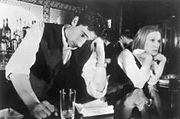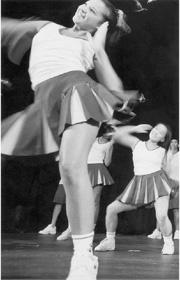AS SEX-OBSESSED as Hollywood may be, interracial relationships are still risky business for the movies—as taboo as show ing a gay embrace. Romeo Must Die features not even one kiss between its romantic leads Jet Li and Aaliyah, nor does Anna and the King with Jodie Foster and Chow Yun-Fat. So people take notice of Eric Bross’ 1998 Restaurant, a pleasant but otherwise unremarkable small indie film about a white man attracted to black women. It isn’t just gay audiences who are starved for movies reflecting a bit of their own realities.
RESTAURANT
directed by Eric Bross
with Adrien Brody, Elise Neal, and Lauryn Hill
opens April 7 at Broadway Market
Written by Tom Cudworth, Restaurant revolves around a group of aspiring artists waiting tables at a yuppie-ish bar and grill in Hoboken, New Jersey. The location faces Manhattan, which stands imperious and aloof, “like a beautiful woman I’m afraid to approach,” says Chris (Adrien Brody), the head bartender-cum-playwright. He’s the familiar youth hoping to become Somebody, and The City is much farther in his psyche than its geographical distance across the Hudson River. His relationships with African-American women remove him further from his working-class roots and his memories of a bigoted, violent father.
Enter new waitress/chanteuse Jeannine (Elise Neal), who immediately catches Chris’ puppy-dog eyes. She’s beautiful, she’s black, and why she falls for a white guy with a huge nose is a question the film never quite answers. Chris is still in love with ex-girlfriend Leslie (Lauryn Hill, in a brief appearance), and the creep factor of his racial preference mounts as Jeannine moves into the same apartment that Leslie formerly occupied (the one in which she was “deflowered” by Chris). As a co-worker jokes, Jeannine is Chris’ “Chocolate Fantasy II.”
With his sincere, expressive face, Brody is always interesting to watch, but Cudworth’s script is often too casual as it raises questions about race and class. Chris acknowledges that his attraction to black women may be rooted in guilt. However, glib statements like, “If my dad rolled over in his grave every time I did something he’d disapprove of, he’d be a rotisserie,” make you wish that Spike Lee had been consulted on dialogue and character. (See Brody as the misunderstood Brit-punk-wannabe in Summer of Sam.) Although the able ensemble cast includes The Cosby Show‘s Malcolm-Jamal Warner, who’s accused of being an Oreo by the homeboys in the kitchen, Restaurant doesn’t meet its potential. This is low-calorie fare.







